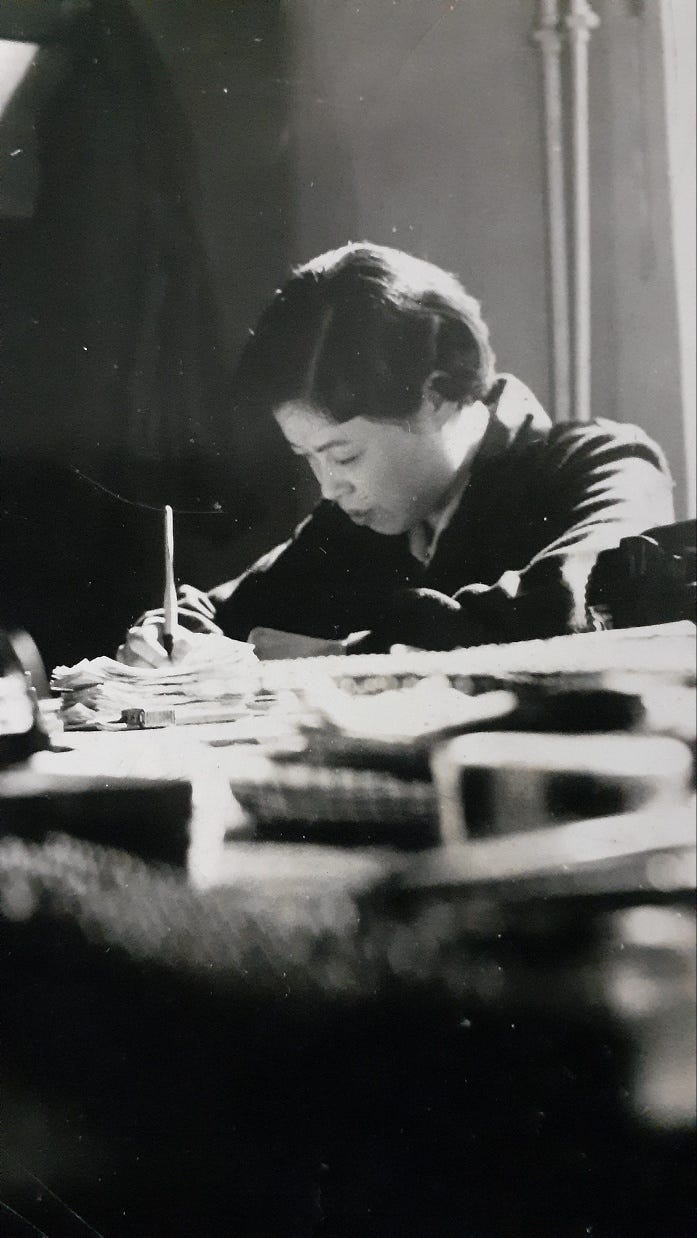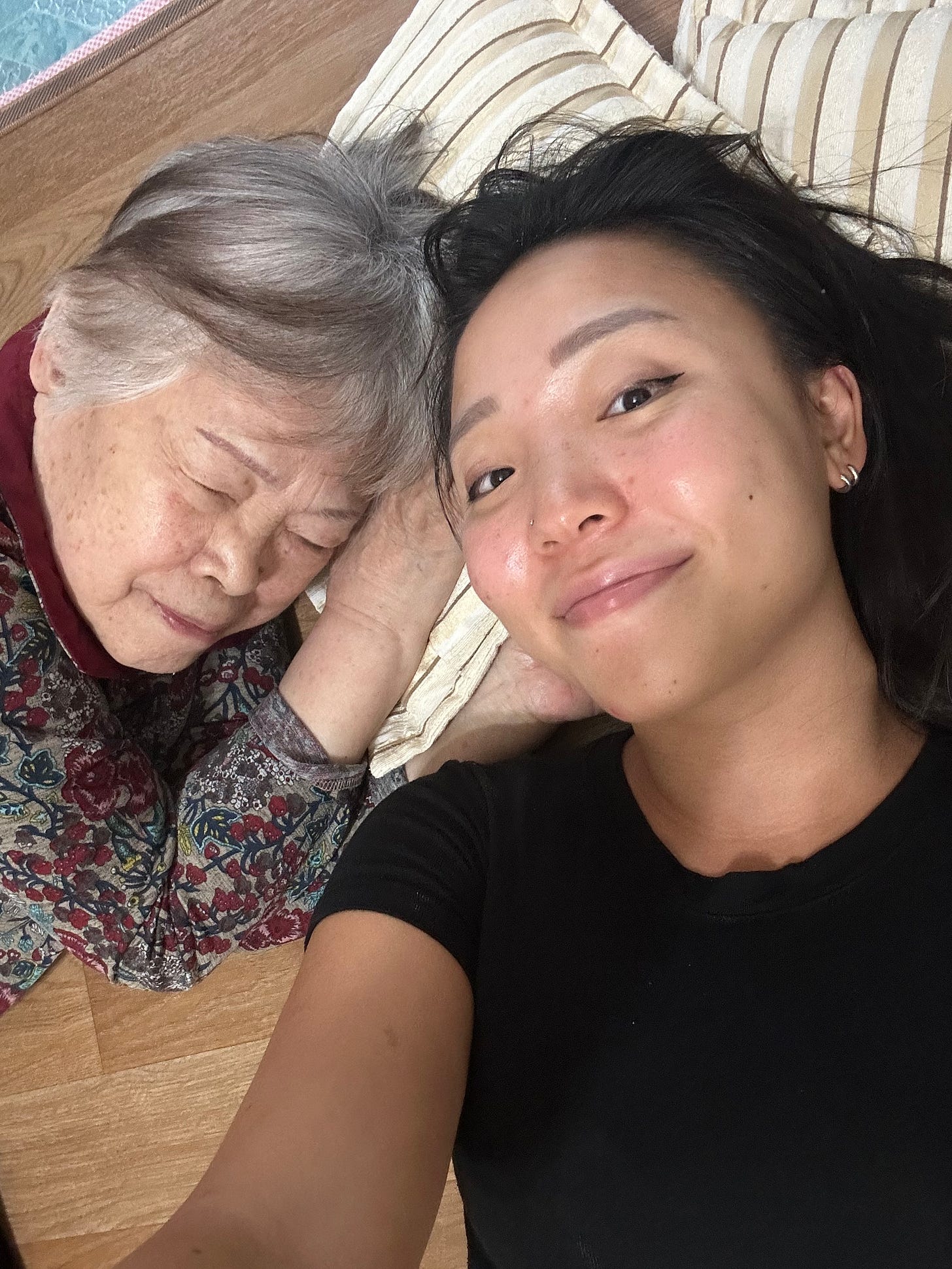This is what I don’t show on Instagram of my trips to Korea
Every day is a goodbye, every subway ride a transit through grief.
As I take the train between the opposite ends of Seoul, I cry on Line 7.
I rode up and down this line with my grandfathers a few times a week as a child. At my mother’s childhood home south of the river, my grandfather would pack some tangerines and my books in my backpack before we headed to Isu station. We read side by side in silence for an hour until arriving at Nowon at the end of the line. Then, we took the escalator up to exit 6, where my paternal grandfather was waiting at the top of the tunnel, his potbelly peeking out before the rest of his beaming face. My grandfather would transfer my small hand to my other grandpa’s, wave goodbye, and head down the escalator for the hourlong subway ride back to Isu. A few days later, I would take the same trip in reverse, my father’s father carrying my backpack this time.
I think about their silent dedication every time I take line 7, even more so since my paternal grandfather passed in 2016. After missing my annual Seoul trip last year, my longing for my grandparents reaches a breaking point, and I decide to book roundtrip tickets to Seoul for the entire month of May.
As usual, my intention is to fit every consumer experience possible into the four weeks. The basic tourist-y parts of my checklists—skin treatments, Hongdae shopping, cafe-hopping in Seongsu, student plays at Daehak-ro—overlap every year. My food wishlist is predictable too, as I rattle off the same juvenile requests to my family like an excited teenager: soondae, tukbokki, jajangmyun, hotteok, fried chicken, Korean pizza and pasta.
This year though, I’m a little bit older, a little more independent, and have a little more time to spare. I loosely dream of spending my weekends traveling around the country visiting seaside cities like Busan and Sokcho, because I’ve only really explored Seoul and Jeju, where my family members are based.
But soon after I land, it becomes clear that a carefree trip is a far-off fantasy. Just as I’ve grown older, so too have my grandparents. And this trip in particular may be my last time seeing my grandfather at home.
Whenever I fly back to Seoul, time quickly reveals its cruel speed. My hours here feel like grains of sand in an hourglass, slipping away between my fingers. A morbid countdown begins in my head: Five nights left at my Sanggyedong grandmother’s; ten afternoons spent drinking coffee with my Bangbaedong grandmother; one final goodbye for my grandfather.
There’s a mix of both duty and jeong that dictates my time here. The duty: as the eldest granddaughter by 12+ years, I need to fill my role as caretaker in Seoul. I dole out cash allowance envelopes to my grandmothers and my younger cousins. I take my paternal grandmother grocery shopping so I can fill her fridge with pricey imported fruit from the department store. I make sure to divide my time evenly between my maternal and paternal sides, because I’ve gotten criticized before for favoring one side over the other. I do all this because I know that my behavior is scrutinized as a reflection of my parents and their decision to immigrate and leave my family behind.
The jeong, or strong bond, comes from the fact that my grandparents raised me for much of my childhood. Every summer, my parents sent me back to Seoul to stay with them, and during the school year, they flew to San Jose to babysit me for months at a time. When I think back to my formative years, I have more memories with my grandparents than I do with my parents.
This trip, I’m spending as much time as I can with my maternal grandfather. I used to spend afternoons with him sprawled on our sticky bamboo mat reading Korean comics while my grandfather slowly fanned me with his right hand and held down a book with his left.
That book-loving grandfather was diagnosed with Alzheimer’s 11 years ago. Six of those years were spent in a slow but steady forgetfulness, and the last five have dipped more dramatically into cognitive and physical decline. Every time I look at him, I remember the energetic, strong-willed, intelligent grandfather who read books in both Japanese and Korean, won company-wide tennis tournaments, and hiked every peak in South Korea.
But after he suffered a stroke two months ago, he hasn’t been able to speak more than a word at a time. At this point, it’s not clear that he registers any of us in his memory. My grandmother now spends most of her days caretaking for him at home, which has taken a significant toll on her mental and social health. But still, we’ll sneak out of the house and head to the market, where she buys me my favorite seasonal vegetables to fry or socks from the Made-In-Korea underwear vendor by the subway station.
I’m not sure how many years my 90-year-old paternal grandmother has left, either. When I visit her, we lay side by side on the floor as I listen to her stories about graduating from Seoul National University’s nursing program after the war and moving to Germany to put my father through middle school. She fusses over how short my crop tops are and pulls out velvet blouses for me from the back of her closet, telling me that they won’t be of any use to her when she’s gone. Every time I leave her house, she tugs at my arm and asks if I won’t stay for a few more hours.
None of this is captured in what I post on Instagram about my trip. What I do post: galleries in tucked-away neighborhoods, musicals with writer friends, pictures of fried chicken and nengmyun. It can feel disingenuous to post glitzy highlights of the city, when that’s not the reality of my time here. Yes, I occasionally hop off the train to eat my way through my food checklist, but mostly I’m on Line 7, taking the hourlong subway ride back and forth between my grandmothers.
And on the subway between my grandparents, I shed my tears. I lean my head against the handrail, absorbing their smell, the wrinkles on their skin, the memories they’ve shared. I try to inscribe their details into the furthest reaches of my mind.
This trip feels more urgent than others, as it may be the last time I see my grandfather in our family home. Since his stroke, my grandfather has reached the point where he needs help bathing. This is the line that we drew a long time ago for my grandmother—with his strength and temper, she could be injured coaxing him into the bath. It’s a matter of months before we’ll have to move him to an Alzheimer’s nursing home.
As I write this, I’m sitting next to my grandfather in the living room, where my grandmother and I are watching episode 14 of the K-drama When Life Gives You Tangerines. The father in the series, who shows an unwavering love for his eldest daughter, reminds us of my grandfather’s younger self.
A child runs through the streets yelling “Ice-Kekki!” with a box hung around his shoulder. My grandmother looks up at me. “Your grandfather did that too,” she says. “He sold ice cream so he could afford school tuition.”
I drift off into sleep while my grandfather watches the screen, sipping his coffee. I have no idea if he can even ingest anything that’s happening, but he’ll burst out into a chuckle once in a while.
So much of what made my grandfather who he is is now gone to the illness. Alzheimer’s has made him short-tempered, cranky, and the stroke has taken away even his words. But when flashes of his old self come out, when glimpses of his warmth or fussy love break through, I realize that I’ve already accepted over the years how much I’ve lost of him.
These, too, are the days I don’t post on Instagram, the quiet afternoons where I’m just sitting still next to my grandparents. They’re too human for a social media platform, too mundane for any fancy filter. They’re too precious to share.
At night, I post the day’s discovery of salt bread, my brief respite at the Cheonggyecheon outdoor library. And then I pack for my hourlong subway ride again, the one I’ll take in the morning across the city.
Every day is a goodbye, every subway ride a transit through grief.









So beautifully written. Thank you for sharing this <3
Love you Iris!! I think it’s so, so important to keep your most cherished memories offline 💖